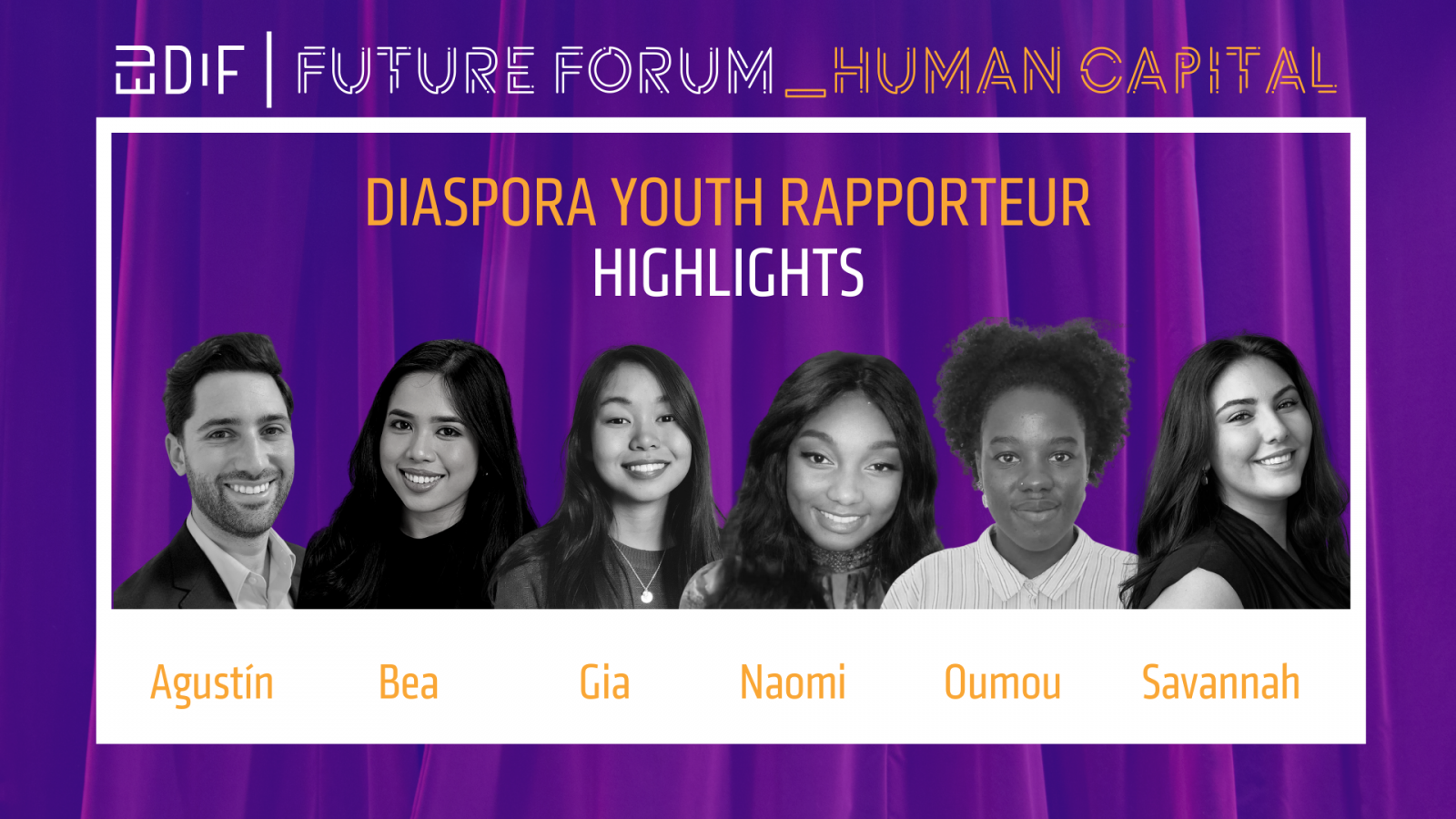
One week ago, we held the second edition of the Future Forum. This time we explored the theme of human capital through 10 sessions and three practical workshops. This year’s conference brought 50+ speakers and moderators together to exchange and examine different diaspora engagement practices from around the world and across the topics of entrepreneurship, investment, skills development, green innovation and more.
A special addition for 2022 came in the form of our six Diaspora Youth Rapporteurs. Their highlights in the closing ceremony give an excellent flavour of the conference and centre the perspective of young people in the diaspora, one that is intersectional, inclusive and future-facing…
Collaboration is key for diaspora-led human capital development
Partnerships and networks are the main channels for mobilising the diaspora for human capital development. The sessions showcased several skills-transfer initiatives that empower diasporas to engage with their heritage countries, including cultural exchange visits, knowledge exchange platforms, academic networks and mentorship programmes. While the youth are already very active in this space and eager to serve as bridges between their countries of residence and heritage, there is still room to expand and formalise their role in diaspora engagement policies and practices.
‘Modern’ skills under the spotlight
Many human capital development initiatives leverage young people’s digital, entrepreneurial, and soft skills to create innovative solutions to the world’s challenges. These skills should be fostered early to help young people prepare for increasingly digital economies and technological societies. These skills are also essential for supporting the green transition; technological competencies will be increasingly important for the green jobs of the future.
Design with the diaspora (and youth diaspora!)
Individual characteristics influence the uptake of diaspora engagement initiatives and projects, which should be factored into the design. For instance, different diasporas (individuals and communities) present diverse patterns of behaviour, schedules and motivations for engaging with their countries of heritage depending on their age, gender, locality, and so on. The diaspora is a unique yet heterogeneous set of development actors, and the youth is an equally heterogeneous subgroup within the diaspora. Consequently, diaspora and diaspora youth should be consulted when designing diaspora engagement policies to increase their uptake of these initiatives.
Celebrating the reciprocal nature of learning
Human capital is not only developed in schools and other formal education institutions. It also occurs in homes, communities, cultural spaces and workplaces, amongst others. This means that a wide variety of actors, such as non-governmental organisations, mentors, internship supervisors, entrepreneurs, community leaders, and more, play a role in human capital development. That diaspora are active in all these spaces and roles presents a panoply of opportunity for impactful partnerships.
Taking a whole-of-system approach to human capital development is the way forward, but we must remember and celebrate that the learning relationship is reciprocal. For example, when young people learn from their mentors, supervisors or community leaders, these actors stand to gain from engaging with youth, especially on issues that concern their futures.
How do we scale up?
The Future Forum 2022 was an excellent opportunity to learn and celebrate the role and impact of human capital development involving the diaspora in countries of residence and heritage. The sessions highlighted the potential of the diaspora for development and shared lessons from concrete actions, but one recurring question was: How do we scale up? How do we mainstream diaspora involvement throughout development for long-term global gain? From the speakers’ enthusiasm about each other’s practices, part of the answer is to continue sharing experiences, experimenting and reflecting with as diverse a group as possible.
Who is in the room?
Commissioner Urpilainen opened the Future Forum with the important notion that “we must put people first to build more inclusive and sustainable societies”, and that to do so we must bring people together.
The sessions and practical workshops certainly brought a wide variety of people together from around the global diaspora-development ecosystem. Yet, in terms of inclusion, a recurring observation was presented: diaspora engagement policies and practices cannot be replicated directly in different contexts because the superdiversity of the diaspora requires nuanced understanding and tailoring. Thus, for effective policy making and implementation for a greener more sustainable future, we must ensure that decision making spaces are as inclusive as possible. As international actors seek ways to empower diasporas and nurture and harness their human capital for development, we must always ask the question: Is anyone being left behind?
Looking ahead
Across all Future Forum sessions, and embedded in the Priorities for Europe and the Sustainable Development Goals, is the notion that we should be future-facing and seek long-term partnerships for inclusive development. What is more long-term or future-facing than putting youth at the centre of policy development? There is a lot of work to be done, but we, the youth of the world, have shown our commitment to a future that is inclusive and sustainable. The time to act is now, so let us – all of us – be part of the solution.
A week after the Future Forum, with a fresh eye on the conclusions presented at the end of the conference and set out above, the Diaspora Youth Rapporteurs’ three priorities remain the need to…
- Address and breakdown barriers which restrict the participation of asylum seekers, refugees, diaspora youth, and those otherwise not currently fully represented in the diaspora-development discussion.
- Enhance the inclusion of diaspora youth in decision making from the beginning by creating new spaces for youth involvement as well as increasing their participation within existing diaspora engagement settings.
- Raise awareness of the contributions of diaspora youth to inclusive development in host countries (and the challenges faced), and advocate for their inclusion in decision making beyond diaspora engagement.